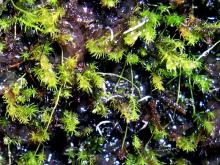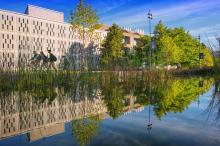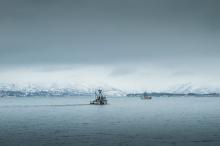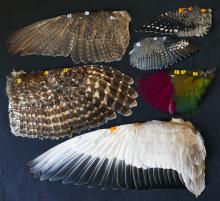News
-

Collecting the Impossible moss: BC species key to charting 1 billion years of plant evolution
October 23, 2019
An international team of researchers have completed a massive effort to sequence genes from more than 1,100 plant species—an undertaking that saw UBC botanists collect rare mosses from remote corners of BC, and travel to the South Pacific to collect parasitic plants. "One of the crucial… read more
-
Why are bald eagles such great gliders? It's all in the wrist
October 23, 2019
Birds come in an astounding array of shapes and colours. But it’s their physical prowess—like a bald eagle’s incredible ability to soar—that captivates human imagination. An enduring mystery is why bird species with similar flight styles or body sizes don’t have… read more
-

Atmospheric pressure impacts greenhouse gas emissions from leaky oil and gas wells
October 18, 2019
Fluctuations in atmospheric pressure can heavily influence how much natural gas leaks from wells below the ground surface at oil and gas sites, according to new University of British Columbia research. However, current monitoring strategies do not take this phenomenon into account, and therefore… read more
-

Two UBC Science students receive Canada’s largest STEM scholarship
October 15, 2019
First-year UBC Science students Helen Zhang and Lauren Moody have been named 2019 Schulich Leader Scholars. They were among 1,400 nominees across Canada competing for 50 scholarships, valued at up to $100,000 each. “With 50 outstanding students selected in Canada each year it is all but… read more
-

How a new UBC program is tackling the booming field of computational linguistics
October 8, 2019
We ask Google to pinpoint the nearest café all the time, but how are language and computers integrated? UBC Master of Data Science in Computational Linguistics director Bryan Gick and assistant professor of Computational Linguistics and Information Science Muhammad Abdul-Mageed, both… read more
-

Climate change could pit species against one another as they shift ranges
September 30, 2019
Species have few good options when it comes to surviving climate change—they can genetically adapt to new conditions, shift their ranges, or both. But new research in PNAS indicates that conflicts between species as they adapt and shift ranges could lead experts to underestimate extinctions… read more
-

UBC ecologist honored by American Museum of Natural History
September 26, 2019
Claire Kremen, a UBC ecologist and biologist whose research involves reconciling agricultural land use with biodiversity conservation, has been awarded an honorary degree by the American Museum of Natural History (AMNH). Kremen received the degree Doctor of Science Honoris Causa from the AMNH… read more
-

Rapidly changing Arctic fisheries potential requires comprehensive management
September 25, 2019
The migration of fish due to unmitigated climate change could net fisheries in the Arctic 37 times more fish than current annual catch amounts by the end of the century, a new study from the University of British Columbia has found. But, the researchers warn, any future commercial fisheries must… read more
-

Four UBC Science researchers elected to Royal Society of Canada
September 10, 2019
Two UBC zoologists, a mathematician investigating differential equations, and a fisheries economist have been elected to the Royal Society of Canada. The four are among nine UBC researchers recognized by the Society this year, and join the almost 40 UBC Science researchers elected to the RSC since… read more
-

Let it glow: How smartphones and glowing dots could revolutionize medical tests
September 9, 2019
Russ Algar researches luminescent materials for a variety of uses—including point-of-care diagnostics. The UBC chemist is combining materials that emit light when stimulated and smartphone technology to develop inexpensive, uber-portable medical tests. What are point-of-care diagnostics? … read more
